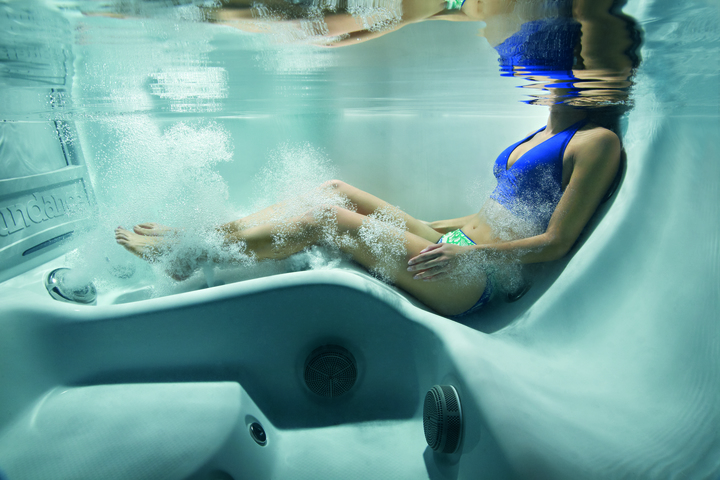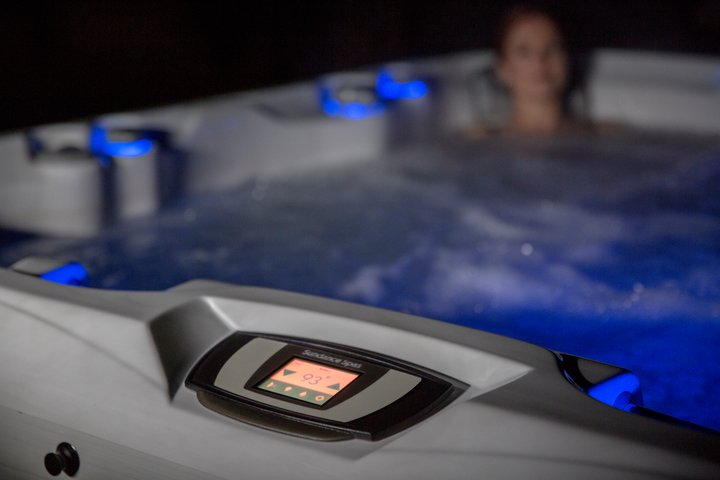Coming home to relax in the warm, crystal-clear water of your hot tub is the perfect way to end the day, and the last thing you want is for your plans to be foiled by dirty water!
Your water care is essential, and it all starts with your hot tub chemicals.
Not only is it unsafe to soak in dirty water, but the quality of your spa water will have a significant impact on your entire hot tub system, from your filtration and plumbing to your water heater and shell!
Using the right chemicals will keep your system running at its best and protect it from unnecessary damage over the years.
After all…your hot tub is an investment, and you want to get the most enjoyment out of it as possible.
In this article, you’ll find the best hot tub chemicals to include in your maintenance routine, along with some simple ways to reduce the number of contaminants your water is affected by!
Let’s get started!
6 Hot Tub Chemicals for Clean, Sparkling Water
Not all hot tub chemicals are designed equally, and while there are some you should always have in your routine, others will be helpful additions (numbers 5 and 6) that can further support your water for those times it requires extra care.
1. Sanitizer
Your sanitizer is an essential hot tub chemical that keeps your water clean, breaking down bacteria as it forms.
Hot water is the perfect environment for bacteria to thrive, so keeping your sanitizer levels in their proper range is essential to maintaining the cleanliness of your water for the safest soak possible.
There are various types of sanitizers you can use for your hot tub, and which one you use for yours will be based on your own unique needs.
Chlorine-Based
While chlorine itself is a sanitizer, there are additional sanitizer options available that produce lower levels of chlorine to treat your water.
Each one of these options will come with its own pros and cons, which will influence which one is a good fit for your lifestyle.
Chlorine
Chlorine is by far the most well-known and widely used sanitizer, and for good reason.
Not only is it an affordable option, but is also one of the most effective sanitizers on the market.
Chlorine easily breaks down bacteria and holds up better than some of the other options available, meaning you’ll not only use less of it, but you’ll be confident your water is always safe to use.
When using chlorine, you’ll want to ensure your sanitizer levels remain between 1 to 3 ppm (parts-per-million).
Bromine
Bromine is the second most common sanitizer and is often used by hot tub owners seeking a less harsh treatment chemical.
This sanitizer offers a softer soaking experience as it has less-harsh effects on the skin and doesn’t have the strong smell that chlorine can.
The downside of bromine is that it’s more costly and breaks down quickly in the sun, leading to more frequent treatments to maintain your water.
If bromine is your chosen sanitizer, you’ll want to maintain its levels between 3 to 5 ppm.
Salt
Saltwater hot tubs and pools have taken off in popularity over the last decade.
While many believe saltwater systems are chlorine-free options, this unfortunately isn’t the case.
Saltwater systems use salt cells to sanitize your water. As it passes through the cells, the salt is broken down into various components to treat the water, one of which is chlorine!
While these systems certainly don’t produce as much chlorine as a full chlorine system, they are certainly not a chlorine-free alternative.
One of the most appealing reasons people opt for saltwater systems is the luxuriously soft soaking experience they provide. In fact, many people have discovered that saltwater systems leave them with drastically softer skin and hair than full chlorine systems do.
While saltwater provides a comfortable soaking experience, it can be detrimental to your system, increasing the risk of corrosion to your shell and entire plumbing and heating system.
Chlorine-Free
Not everyone can soak in water that’s treated using chlorine-based products, such as those people who struggle with sensitive skin or have a chlorine sensitivity.
This is where biguanide comes in.
Biguanide
Biguanide is a completely chlorine-free sanitizer and is one of the only ones widely available on the market.
This sanitizer is not only odorless but also creates a comfortably smooth soaking experience.
Additionally, it’s one of the most stable sanitizers, combating the UV rays of the sun and the high temperature of your water with ease.
Unfortunately, biguanide is not only expensive, but it also isn’t as effective as its chlorine counterparts.
If you’re using biguanide as your chosen sanitizer, your levels should remain between 40 and 50 ppm.
2. pH and Alkalinity Treatments
The quality of your water is important, and your pH and alkalinity treatments will ensure your water is always balanced.
Essentially, pH and alkalinity refer to how hard or acidic your water is. If not balanced properly, it can result in corrosion or scale buildup on your shell and throughout your system.
The three hot tub chemicals you’ll need to have on hand to maintain the balance of your water include:
Your water’s natural chemistry will be unique to your city, and how much of these products you use will heavily depend on that starting point.
To find your water’s pH and alkalinity levels, you’ll need to test it using a water test kit, pH test strips, or a digital meter.
When properly balanced, your water levels should be as follows:
pH: 7.2 to 7.8
Alkalinity: 80 to 120 ppm
If either of these levels falls out of range, you’ll want to add the appropriate chemical to bring them back into a safe balance.
For example, if your pH levels drop below 7.2, your water is too acidic and is no longer safe to soak in. Before using your spa, you’ll need to use your pH increaser to restore your levels to a safe range.
After treating your water, wait 30 minutes, then test it again to verify the levels have returned to normal.
3. Oxidizing Shock Treatment
An oxidizer is a shock treatment that would be added to your water to help support its overall health.
You may be wondering why you would need an oxidizer for this when you already use a sanitizer, and it’s simply to combat one thing sanitizers can break down; organic matter.
Organic matter in your hot tub can come from a range of sources, including
- Dead skin cells
- Body lotion
- Cosmetics
- Hair products
- Perfumes
It can even come from any detergent that’s on your bathing suits that may not have been fully rinsed out during their wash.
The oily makeup of organic matter makes it difficult to be broken down by your sanitizer, and if not combated, these oils can build up over time and result in foamy or cloudy water beginning to form!
Not only would this leave you with additional work to clear up your water, but it also makes it unsafe to soak in your hot tub until your water is clean and clear again.
The good news is that there are ways you can minimize the amount of organic matter that ends up in your water.
Some root causes simply can’t be avoided, such as dead skin cells. Others, such as body lotions or hair products getting into your water, can be minimized with a few minor adjustments to your regular spa routine.
Steps you can take to keep your water clean and minimize the number of hot tub chemicals needed to maintain it include:
- Showering before each soak to wash off any lotions or makeup
- Keeping hair ties and hats near your hot tub so you and your guests can easily keep your hair out of the water
- Adding tennis balls to your water after each spa session to soak up any oils floating on the surface
- Regularly cleaning your shell using a spa vacuum
4. Filter Cleaner
Your filters have an important job and play a large role in keeping your water clean, which is why it’s essential to take proper care of them.
Filter cleaner is an essential aspect of this. These cleaners work to soak into the pleats of your hot tub filters and loosen up any debris that’s built up on them over time.
This will keep your filters effectively maintaining your water, pulling even the smallest contaminants out and ensuring your water is crystal clear and ready to enjoy.
Not sure how to clean your filters? Learn how in our filter cleaning guide!
5. Calcium
Depending on your local water quality, you may need to consider adding a calcium treatment during your regular routine.
Generally, if you have naturally soft water in your area, adding a calcium treatment will help give your water the boost it needs to be more easily treated by your pH and alkalinity chemicals.
Ideally, your calcium hardness levels should be within the range of 175 and 250 ppm.
Calcium hardness can add up quickly in your water, and if you add too much, you’ll struggle to bring the levels back down again, often resulting in a full water change.
For this reason, if you need to use a calcium increaser for your water, add it slowly and retest as you go so you don’t overdo it!
6. Clarifier
While all other hot tub chemicals on this list are proactive additions to maintain your water long-term, clarifiers aren’t.
In fact, they’re used as a short-term solution to clear up foam or bring clarity back to a cloudy hot tub.
Essentially, they’re a band aid solution to bring back your clear water if you don’t have the time to manage the issue immediately and need your hot tub.
However, they only work for a short period of time, and if you don’t take the necessary steps to diagnose and treat the underlying cause of your dirty water, it’ll quickly revert back to its cloudy or foamy state.
Your Hot Tub Chemicals Are Important!
As you can see, every hot tub chemical you add to your spa plays an important part in the health of your water.
Forgetting one or using them improperly can result in a damaged system, cloudy or foamy water, and an unsafe soaking experience.
It’s important to test your water every few days to get an accurate reading of your pH, alkalinity, and sanitizer levels, and you should always maintain a well-rounded hot tub maintenance routine to keep your water crystal clear and ready to use!
Buy Hot Tub Chemicals in Orange County
Aqua Paradise is your one-stop shop for everything hot tubs and hot tub care, from top-of-the-line spas to hot tub service and water care. With five convenient locations, we’re serving the communities of:
Visit your local showroom, contact us, or conveniently find your hot tub chemicals through our online store to keep your water sparkling clean every day of the year.




